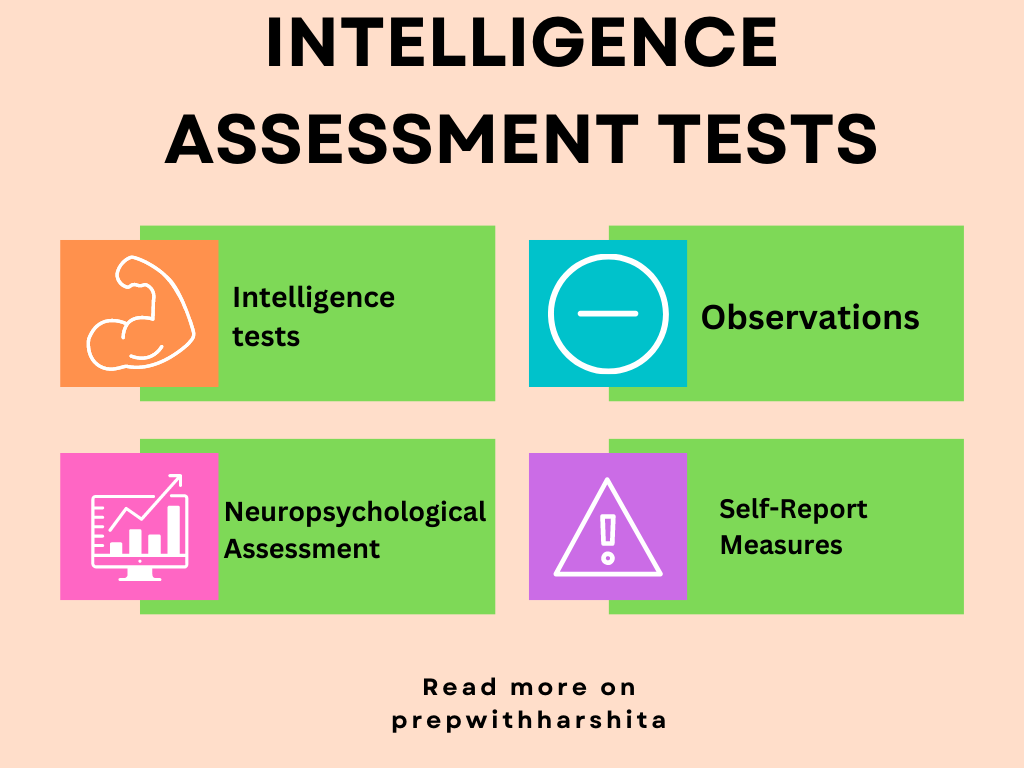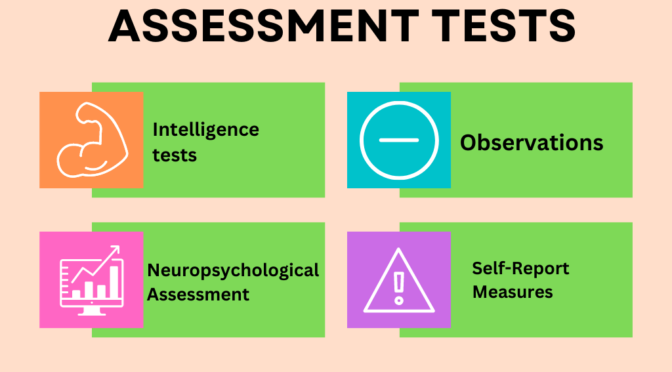Assessment of intelligence refers to the measurement of an individual’s cognitive abilities, including their capacity for learning, problem-solving, reasoning, and decision-making.
There are various methods used to assess intelligence, including:
- Intelligence Tests: Intelligence tests are standardized measures that assess an individual’s cognitive abilities. They also compare them to those of others in their age group. The most commonly used intelligence tests include the Wechsler Adult Intelligence Scale (WAIS) and the Stanford-Binet Intelligence Scale.
- Neuropsychological Assessment: Neuropsychological assessment involves the evaluation of an individual’s cognitive abilities. It is done through a battery of tests that assess different aspects of cognitive functioning, such as memory, attention, language.
- Observation: Observational methods involve the direct observation of an individual’s behavior and performance in various contexts, such as in school, work, or social situations. Observational methods can provide valuable information about an individual’s cognitive strengths and weaknesses.
- Self-Report Measures: Self-report measures involve individuals completing questionnaires or surveys that assess their perceptions of their cognitive abilities and intellectual functioning. Self-report measures can provide valuable information about an individual’s cognitive self-concept and beliefs about their abilities.
Types of Intelligence Tests:
There are various types of intelligence tests that are commonly used to assess cognitive abilities. Here are some of the most common types:
- Wechsler Intelligence Scales: The Wechsler Intelligence Scales are a series of tests that assess a wide range of cognitive abilities, including verbal comprehension, perceptual reasoning, working memory, and processing speed. The most commonly used Wechsler tests include the Wechsler Adult Intelligence Scale (WAIS) and the Wechsler Intelligence Scale for Children (WISC).
- Stanford-Binet Intelligence Scale: The Stanford-Binet Intelligence Scale is a comprehensive measure of cognitive abilities that assesses a wide range of skills, including language, memory, spatial reasoning, and problem-solving. It is one of the oldest and most widely used intelligence tests.
- Raven’s Progressive Matrices: Raven’s Progressive Matrices is a nonverbal measure of cognitive abilities that assesses an individual’s ability to identify patterns and solve problems without relying on language or cultural knowledge.
- Kaufman Assessment Battery for Children: The Kaufman Assessment Battery for Children (KABC) is a measure of cognitive abilities designed specifically for children. It assesses a wide range of skills, including memory, attention, problem-solving, and visual-spatial abilities.
- Cattell Culture Fair Intelligence Test: The Cattell Culture Fair Intelligence Test is a nonverbal measure of cognitive abilities that is culture-free and language-free, making it useful for assessing individuals from diverse cultural and linguistic backgrounds.
- Woodcock-Johnson Tests of Cognitive Abilities: The Woodcock-Johnson Tests of Cognitive Abilities is a comprehensive measure of cognitive abilities that assesses a wide range of skills, including verbal comprehension, visual-spatial abilities, memory, and processing speed.
These are just a few examples of the various types of intelligence tests that are commonly used to assess cognitive abilities. It is important to choose the right test based on the individual being assessed, as well as the specific purpose of the assessment.
Assessment of intelligence can be useful in a variety of settings, including educational, clinical, and forensic settings. It can provide valuable information about an individual’s cognitive strengths and weaknesses. They can be used to inform educational and treatment planning and to identify potential areas for improvement.
However, intelligence tests are not a complete measure of an individual’s abilities and should be used in conjunction with other assessment methods to provide a comprehensive evaluation of an individual’s cognitive functioning.
Also Read: Assessment Techniques of Personality



2 thoughts on “Assessment of Intelligence”